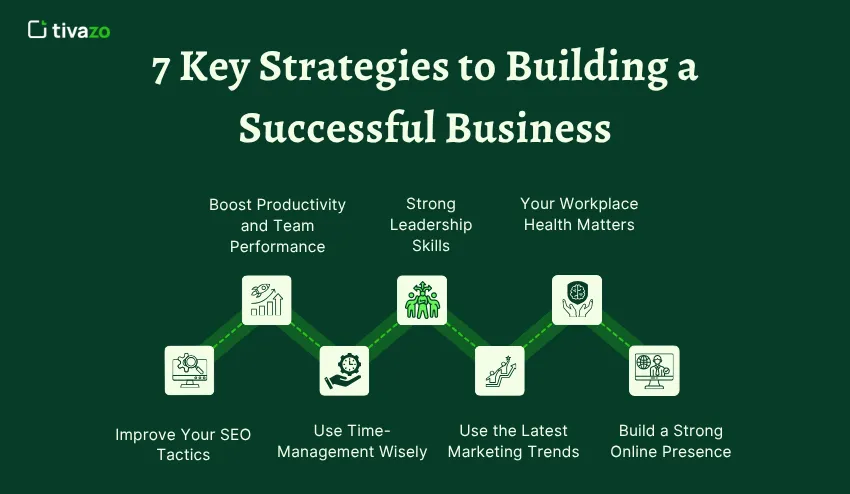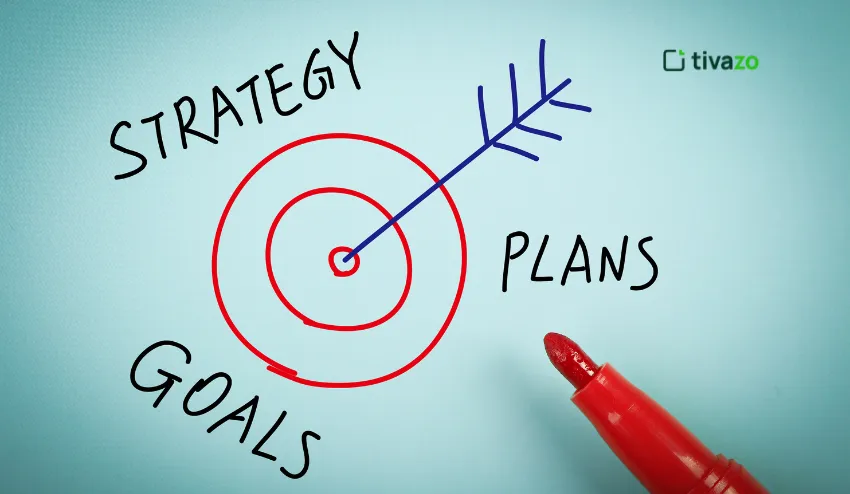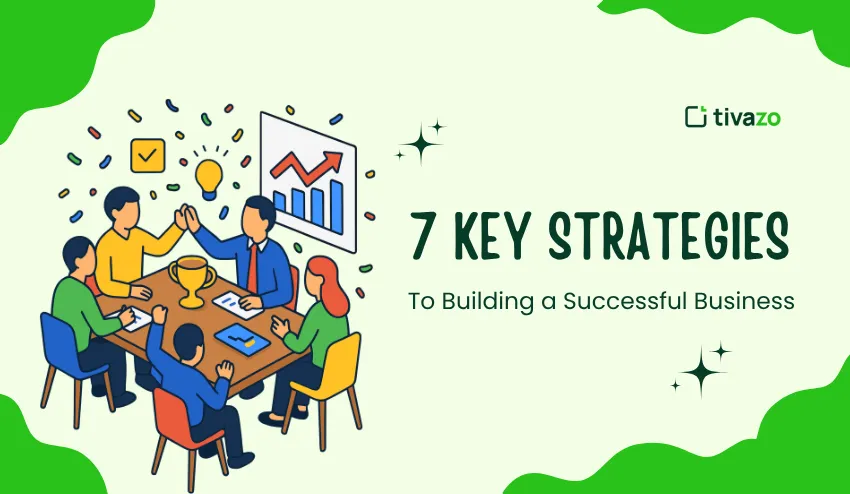Building a successful business in 2025 isn’t easy — whether you’re a tech-savvy start-up or a company that’s been around for years, success now depends on how well you adapt to fast-changing marketing and technology trends. The marketing trends are changing at lightning speed, making it nearly impossible to always stay on trend. And the technology? It’s racing ahead at full speed. On top of that, people are working remotely, half-remotely, or somewhere in between. Some teams have meetings across four time zones. Some haven’t seen their coworkers in person for years.
While that may sound a bit hectic, this also means that things change fast, and you can become one of those fast-growing brands people talk about all the time. One thing we can say for sure – you can’t stand still if you want your business to expand. Whether you’re starting from scratch or already managing a huge team of people, you need to surf the waves of digital marketing trends like a pro. Apart from that, you also need to take care of your team’s performance and productivity. Not to mention that taking risks and making bold decisions should always be on your menu.
That being said, you also require structure, clear goals, good people, and a strategy that actually fits the real world – not just a motivational book or a consultant’s TED Talk. In this guide, we’re breaking down seven areas that truly matter right now. Productivity, leadership, online presence, marketing trends, wellbeing, and smart time-management. And yes – we’ll talk about the ever-changing world of SEO as well, but in a practical way you can actually use.
By the end, you’ll have a list of changes you can start this week, along with key ingredients for growing a successful business in 2025.
7 Key Strategies to Building a Successful Business

1. Improve Your SEO Tactics
If you’ve ever thought, “SEO sounds complicated,” you’re not alone. A lot of companies throw keywords on a webpage and pray Google notices. Google is a lot of things, but listening to prayers isn’t its strongest suit. Creating useful, practical content that feels genuine – that should be your main SEO tactic in 2025.
Using keywords will never get old-fashioned, but being authentic is even more important right now. Google wants to see real expertise, clarity, and relevance. You should really ask yourself, “Where should we get our SEO copywriting services done?” Because writing content people want to read is a skill, and it’s best if professionals do it. However, even if you’re doing it yourself, you can start strong.
Here’s what the numbers say:
- Short pieces no longer have the ‘X factor’. In general, long-form content earns 77% more backlinks.
- Digital marketing is on the rise. It’s growing 11% each year.
That means customers are online, searching, comparing, deciding. If your business doesn’t show up – someone else will.
Start upgrading your business with a few simple steps:
- Update old website pages with fresh info
- Write answers to common customer questions
- Write blog posts and make reels with step-by-step guides
- Use language that would feel natural to your target audience
- Community search results matter. Make sure your brand or business is present on sites like Quora and Reddit.
SEO isn’t just about traffic. It’s about being visible to people who actually want what you offer.
2. Boost Productivity and Team Performance
Let’s be honest, every business claims they want high productivity. But not everyone knows what that actually looks like anymore.
The hard truth not many leaders and managers know about: people are productive for only about 60% of their workday. This has nothing to do with them being good or bad employees – that’s just human nature. Along with interruptions, unclear tasks, meetings that should’ve been emails, or simply waiting for direction.
Here’s where digital tools become lifesavers.
- Time-tracking tools
- Project workflow boards
- Team dashboards
These aren’t just for freelancers or remote workers. Teams can do performance analysis of the projects they’re working on for better coordination and productivity. This allows them to waste less time and see whether some people or departments are overloaded with tasks, while others could do more. In the same way, many professionals now use the best AI tools for technical analysis to evaluate patterns and optimize decision-making in financial contexts. As a result, there’ll be less burnout and more accountability, helping businesses expand faster.
Still, productivity isn’t just numbers and charts. According to studies, companies with high employee engagement see up to 21% higher profitability. In other words, happy, involved employees get more done. Support your people. Don’t only micromanage them.
3. Use Time-Management Wisely
Time management sounds boring, but here’s a twist: the most productive workers aren’t the ones who grind endlessly. A DeskTime study found peak performers work in 75-minute focus blocks, then rest for 33 minutes. Yes, they rest – on purpose. Because when the brain doesn’t get breaks, quality drops, creativity disappears and mistakes multiply.
So ask yourself:
- Does your team have uninterrupted focus time?
- Or are you all hopping from meeting to meeting like digital ping-pong balls?
If productivity feels low, the problem might not be motivation – it might be structure. Block out meeting-free hours. Encourage breaks. Ditch useless status meetings and ask yourself if they could be done in five lines of text.
Time management isn’t a calendar. It’s a philosophy: work with your brain, not against it.
4. Strong Leadership Skills
Here’s a hard truth: you can buy all the tools, software, and strategies in the world, but if leadership fails, everything falls apart just like machinery without reliable Pillow Block Bearings.
Only 33% of employees worldwide report thriving at work, according to Gallup. That’s not because people are lazy. It’s because leadership sets the tone.
Great leaders:
- Communicate clearly
- Have consistent expectations
- Let people learn rather than fear failure
- Stay put even when things go south
Employees work under pressure and experience burnout. That’s your responsibility, too. You should never ignore mental health when it comes to your team’s performance. That has a direct impact on the productivity of your business.
5. Use the Latest Marketing Trends
Long gone are the days when marketers only used ads and billboards. Now it’s an endless world of hi-tech opportunities to be seen there’s visual storytelling, voice search, TikTok, Instagram Reel, YouTube shorts, and a bunch of AI apps that can help generate new content every day, which is why even the top digital marketing agencies now rely heavily on multi-platform content strategies.
The global AI marketing industry is projected to hit $47.32 billion in 2025, growing at 36.6%. That’s massive. AI tools help write content, analyze data, find audiences, and predict trends.
What should your business be doing?
- Experiment with video and short-form content
- Use voice-search friendly language (“near me,” “best,” “how to…”)
- Personalize emails and offers
- Keep your brand voice consistent
Marketing evolves fast. Staying flexible keeps you visible.
6. Your Workplace Health Matters
This part gets overlooked because it isn’t flashy or “cool” – but it might matter more than everything else here.
People aren’t machines. When working on tight schedules, stress can cause a considerable drop in productivity. Burnout is yet another culprit that can sneak up on even the most health-conscious employees.
A major UK study found that 75% of employees feel less burnout when working part of the week from home. Hybrid work helps, as well as flexible hours. Mental health support should also be available when needed.
Don’t just promote a healthy lifestyle – be an example of it yourself. Stay fit and make the memberships to gyms and yoga classes available to your team members.
A few other things you should do:
- Give your employees a chance to make independent decisions
- Respect days off
- Create a culture where asking for help is normal
- Support an active lifestyle
Healthy teams outperform unhealthy ones – that’s a given.
7. Build a Strong Online Presence
You can have great products, great service, even great pricing – but if nobody can find you online, it doesn’t matter. Your digital presence is your reputation.
Here’s where to start:
- Check if your website loads fast and works well on phones
- Write content that explains your mission and values
- Use social media to communicate, not just advertise
- Reply to reviews – good and bad
- Build trust with real stories and real expertise
SEO + branding + content = visibility + credibility. Customers research before they buy. Make yourself easy to find and even easier to trust.
Conclusion

If you’re still reading, congratulations – you’re already doing something most businesses never do: thinking strategically. Not just about profit, but about people, systems, sustainability, and the long game.
And here’s the truth: none of these strategies require perfection. You don’t need to transform your whole business in one week. Take one idea, then put it into action. See what changes, and move slowly like that.
Maybe you start tracking productivity or update your website content. You can also give your team flexible work options or try video marketing. Every step produces data, insight, and experience you can learn from.
Business in 2025 demands adaptability. Your market will evolve, your customers will evolve, and technology will evolve – so the question becomes: will you? We believe the strongest businesses are built on people first, systems second, and presentation third. That mix creates the kind of stability that lasts.
Make sure your team is working like a Swiss clock – simplified time-tracking tools will help boost productivity while reducing bottlenecks. Create a healthy meeting schedule and keep track of your employees’ mental health. The year 2025 is about working smarter and using numerous management tools to automate processes and improve communication between co-workers.




